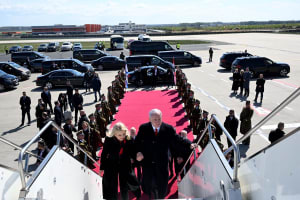How did a government ‘hanging by a thread’ since its inception survive one year?
Today marks the one-year anniversary of the swearing in of Israel's unlikely coalition with Naftali Bennett at the helm

On Monday, June 13, marks one year since the inauguration of Israel's current government – a patchwork coalition made up of eight parties across the political spectrum, which united – for the most part – under one banner: Anyone but Netanyahu.
That this government reached one year is a remarkable feat considering it has been hanging by a proverbial thread since its first day, shrouded by forecasts of its demise from the outset. It was not expected to last the summer of 2021.
“I admit that this is not the government that most of us had hoped for initially,” Prime Minister Naftali Bennett admitted on Sunday, “but against the alternative of continued bickering and chaos we have shown that there is strength in working together.”
Preceded by four national elections in two years and political instability, in which not one politician was able to form a lasting government, the fact that this new government lasted in such an environment is a miracle in itself.
Not easily defined under one ideological umbrella, the complicated coalition is comprised of three right-wing parties, two centrist parties, two left-wing parties and an Islamist party. As a whole, they barely crossed the majority threshold with a 61-seat majority in a parliament of 120.
They succeeded with a power-sharing deal between Bennett – whose party only received seven seats – and Foreign Minister Yair Lapid, whose centrist Yesh Atid party (There is a Future) came in second overall with 17, the second most behind Benjamin Netanyahu’s Likud party which won 30. According to the arranged deal, Bennett would assume the role of prime minister first and then hand over the position to Lapid after two years.
Although Netanyahu’s Likud party won the most seats he was unable to gather enough support to form a majority government. So, the current members of the coalition dug in their heels with a united front against Netanyahu – and formed the government we see today.
And, yet, the powerful persona that is Netanyahu has remained in the Knesset, leading the opposition with enough loyal disciples rallying around him and his agenda, all the while needling the coalition every step of the way and pulling at its loose threads.
As the country's longest serving prime minister before he was replaced in 2021, Netanyahu has been planning his comeback since the day Bennett took office.
Yet, somehow, this government is still limping along, despite having endured defections and betrayals which have only accelerated in the last few months.
The recent blows began in April when an Orthodox Jewish woman from Bennett’s own right-wing Yamina party announced she would no longer vote with the coalition. Then another coalition member – an Arab woman from the left-wing Meretz party – also announced her intention to quit and torpedoed a crucial coalition vote.
In addition, Bennett’s office has been experiencing a shocking staff turnover that led to speculation of more troubles for the prime minister.
Yet despite all this, the fledgling government surpassed its own ideological hurdles in order to pass, not one but, two national budgets. The State of Israel had been operating without a budget for three years due to political instability and Netanyahu’s inability to pass one when he was prime minister.
Bennett became the first Israeli prime minister to visit the United Arab Emirates – more than once – and Bahrain, two new peace partners. Under Lapid, relations with Jordan have also improved and led to a major solar energy deal between Israel, Jordan and the UAE.
Last week and again on Sunday, Bennett listed more of his government’s accomplishments, including the relative quiet on the southern border. In 2019, 1,291 rockets were fired from Gaza; in 2020, 176 and, in 2021, a war with Gaza led to 4,300 rockets fired at Israel.
“In 2022, so far, there have been only six, with no injury or loss of life,” Bennett said. “This is not a coincidence but is the result of a clear and determined policy – decisiveness for every balloon and a steadfast stance in the face of blackmail and violence.
“We also saw this during the flag parade when we did not capitulate to Hamas' threats. In the face of terrorist threats, we held the parade despite Hamas' attempts to threaten us and get the better of Israel once again.”
Much of these statements were a jab at Netanyahu, who has criticized Bennett’s government for weakness on national security.
Regarding Israel’s main existential external threat – Iran – Netanyahu has blamed the Bennett government for tolerating U.S. President Joe Biden’s race back to a nuclear deal. Netanyahu’s tenure coincided with former President Donald Trump who was a staunch opponent of Iranian nuclear capability and pulled America out of the deal.
But in his remarks, Bennett hinted at Israeli military actions – which are usually kept quiet – against Iran.
“In the past year, the State of Israel has taken action against the head of the terrorist octopus and not just against the arms as was done in previous decades,” Bennett said. “The days of immunity – in which Iran attacks Israel and spreads terrorism via its regional proxies but remains unscathed – are over.”
Bennett, in turn, took his own swipe at Netanyahu, saying that his government has also dealt with “the threat from within” referring to “crime and violent nationalism in the Arab sector, and this was after a decade of neglect.”
“Yes, I made the decision to bring in the Israeli Security Agency (ISA) into the domestic security situation as well, to the worlds of terrorism, worlds that could harm the national security of the State of Israel.”
“So this year the government came in and dealt with it, with outstanding results. Murders, shootings and crime in the Arab sector declined considerably in one year.”
Bennett concluded by acknowledging “the possibility of cooperation between people who have different views, who love this country to the same degree.”
“I know that there are those who are mocking us for continuing to fight for the existence of the government despite all the pitfalls and the blows that we have suffered, but to fight for one's country is not ludicrous, it is exalted,” he said. “Indeed, I prefer our lot to be with the fighters and not the mockers.”
The 36th government started off with a dour forecast and little chance for survival. But as it enters its unexpected second year, its main accomplishment is simply something that Netanyahu was unable to do in his past few years as prime minister: Put together a coalition that lasted longer than a few months.

Nicole Jansezian was the news editor and senior correspondent for ALL ISRAEL NEWS.














